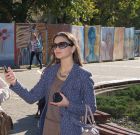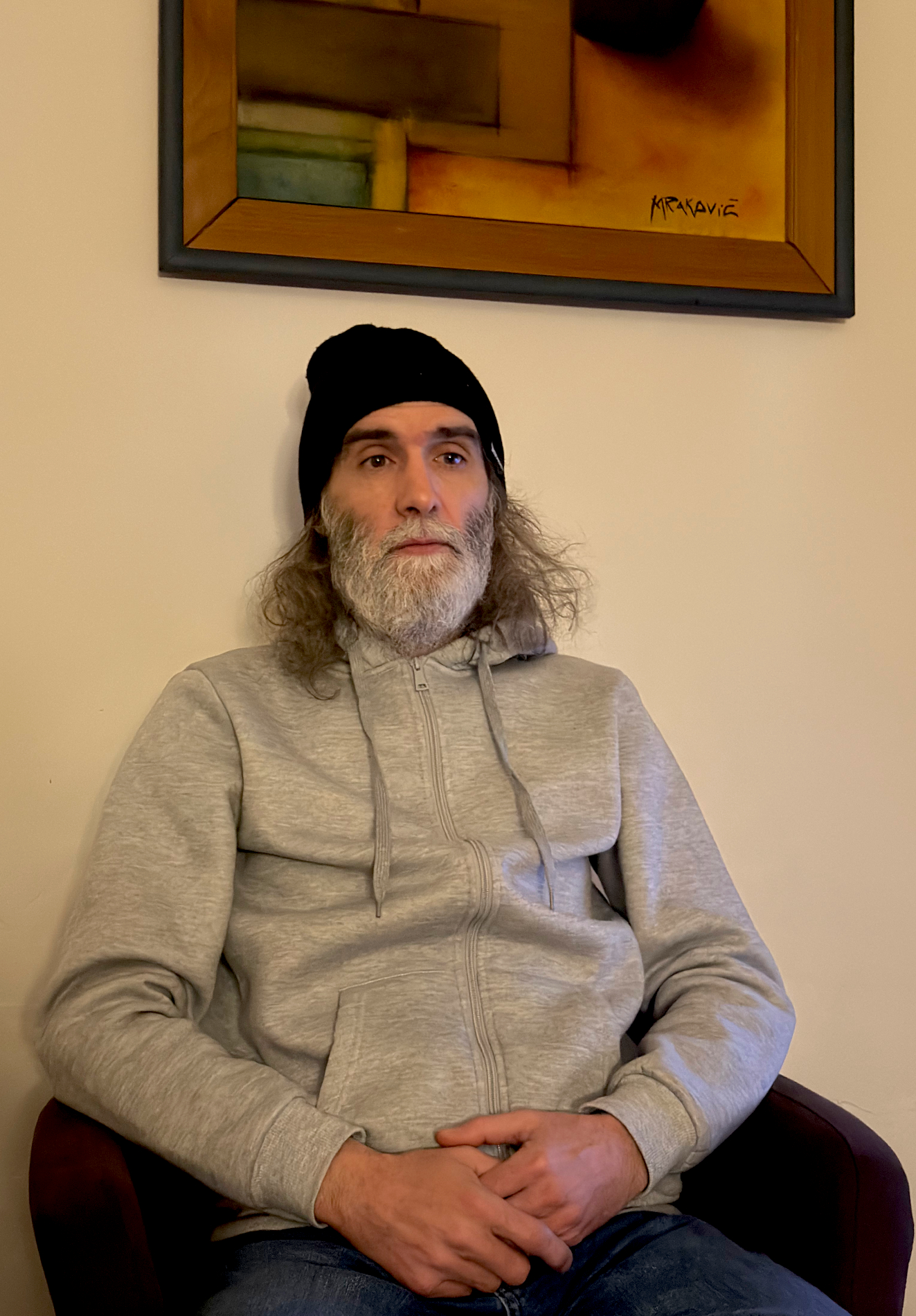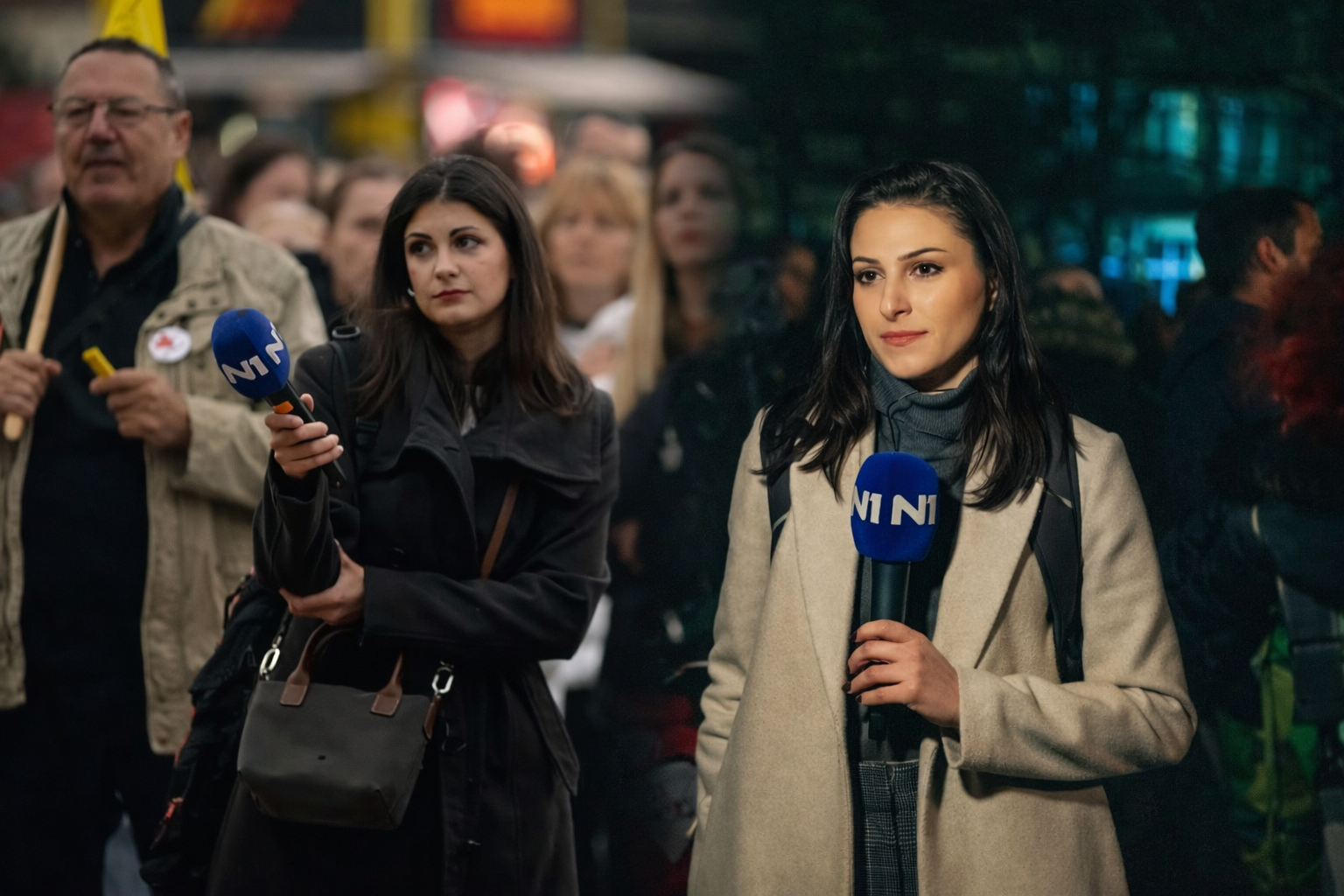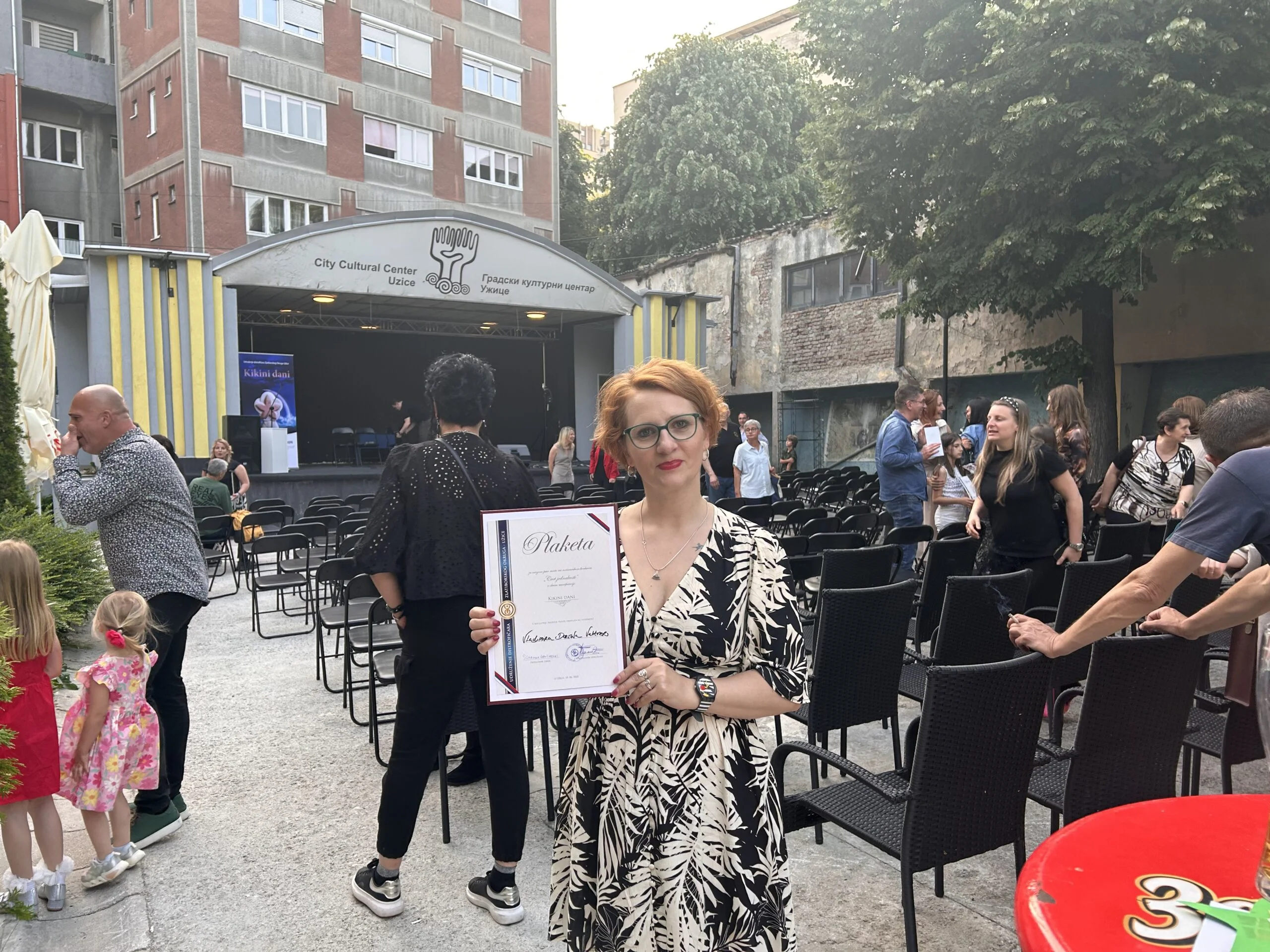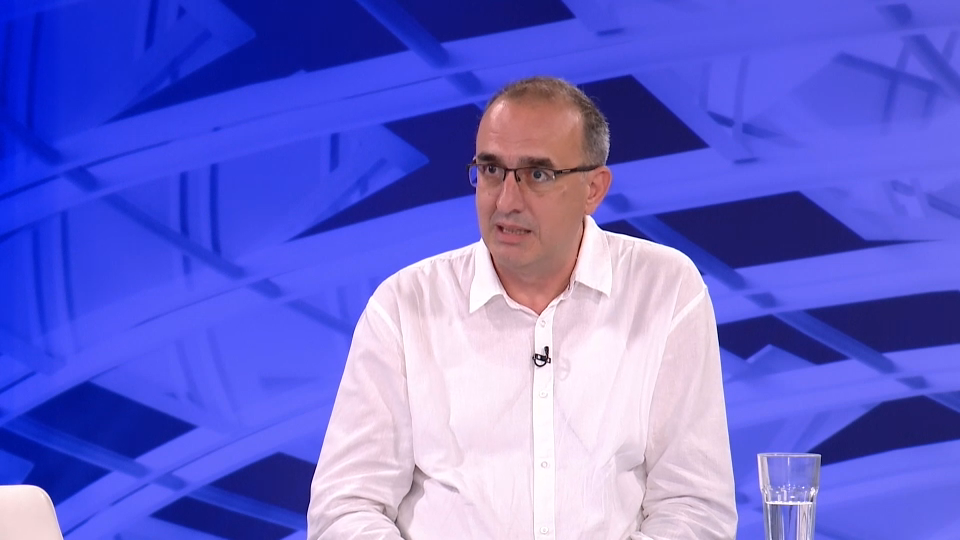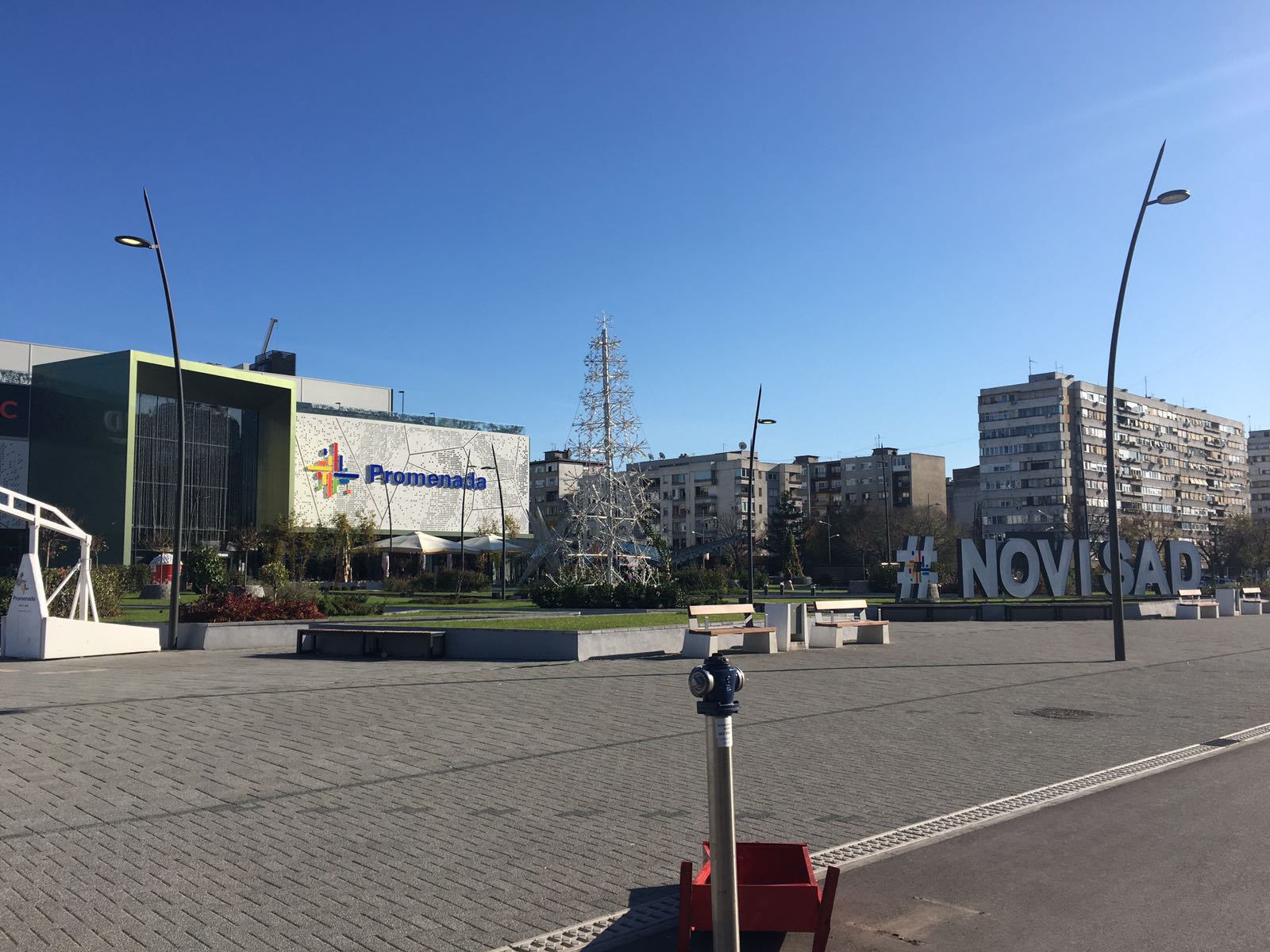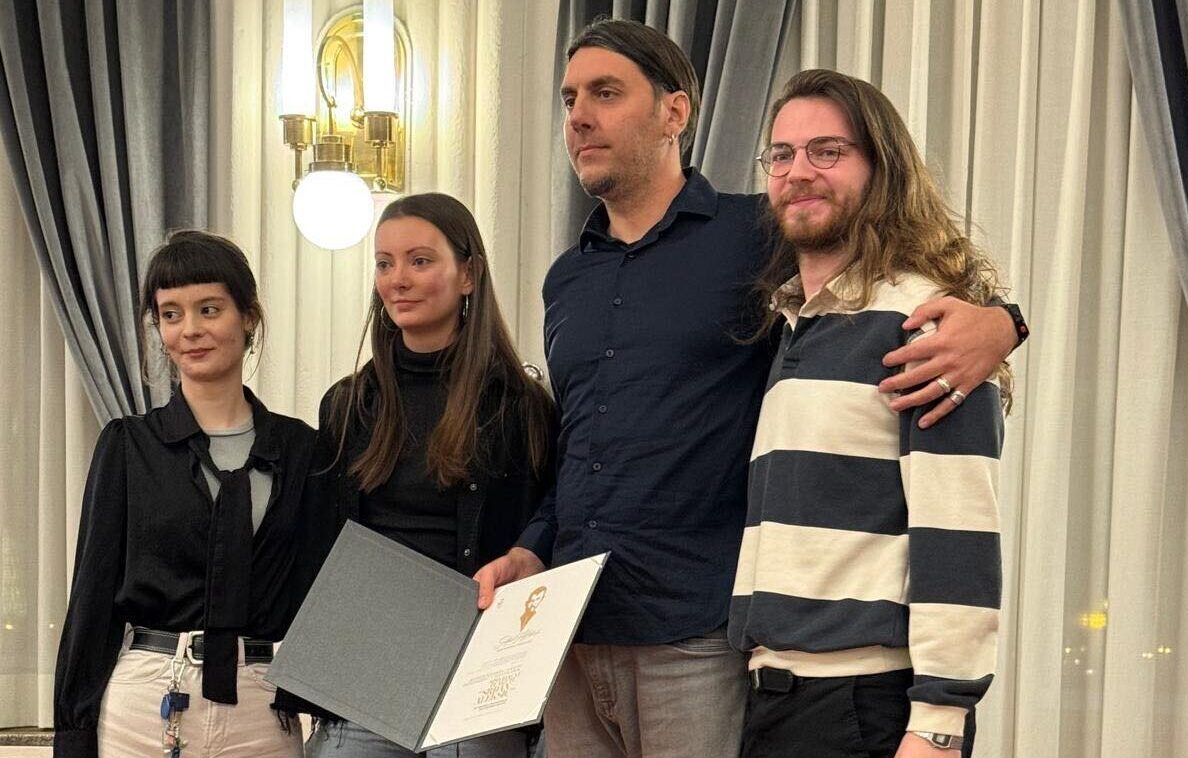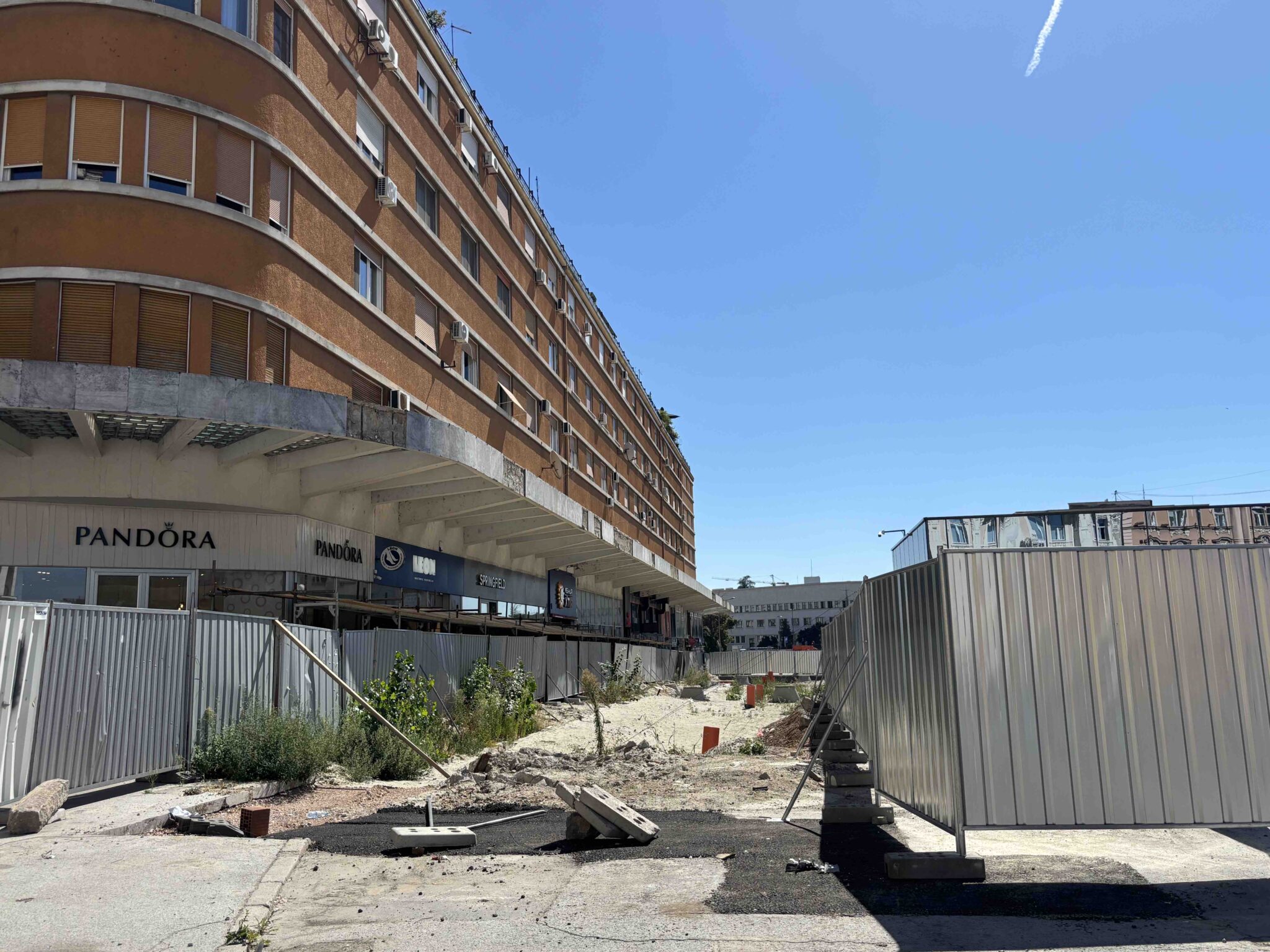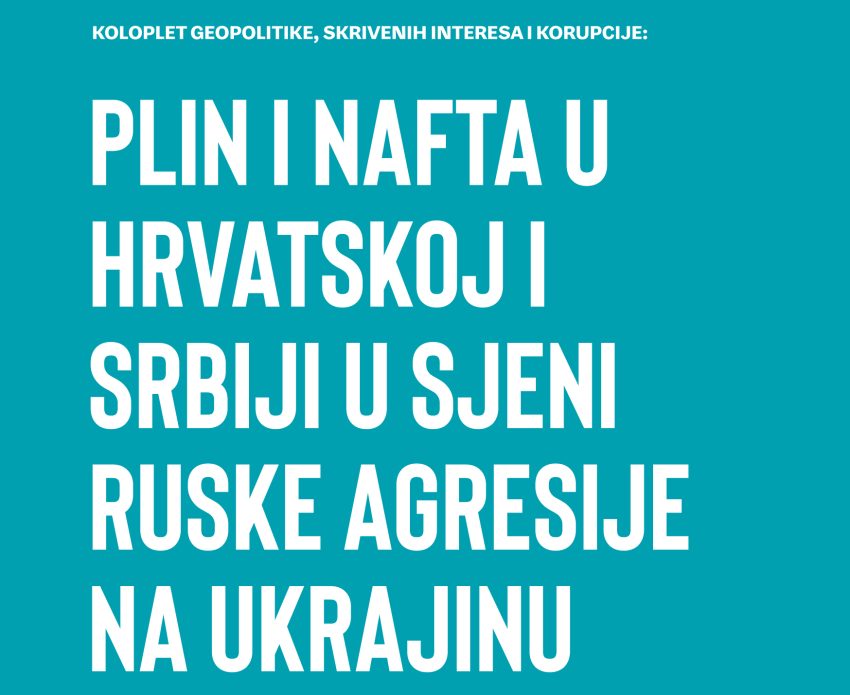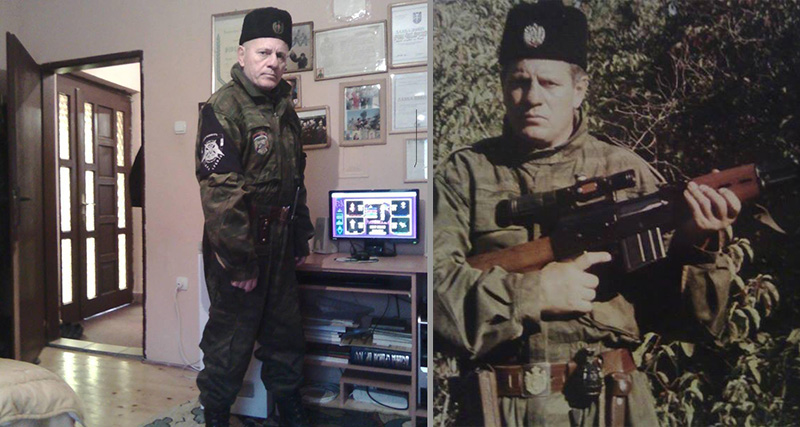
The Basic Court in Nis discontinued a criminal procedure against Chetnik voivode Branislav Vakic, charged with endangering the safety of visitors at the screening of the “Albanian Women are our Sisters” documentary. The screening was supposed to be held on June 22, 2017 in the Media and Reform Center in Nis, but it was cancelled due to a number of incidents caused by Vakic inside the building and far-righters in front of the Media Center.
The court passed this decision on March 6 this year. The Vojvodina Investigative and Analytical Center looked into the court’s decision, which stipulates that the charges pressed by the Prosecutor’s Office in Nis were rejected because Branislav Vakic was suffering from a severe mental disorder for which he was receiving treatment at a psychiatric hospital. Based on the opinion of a medical expert, the court established that Vakic was unable to follow the court procedure any more.
Vakic was charged with endangering the safety of the people gathered to watch the film, because he was wearing a “šajkača“ (Serbian national cap) and a “kokarda” (metal amblem) and was dressed in a camouflage uniform when he threatened the citizens inside the Media Center and said he would bring the members of the banned far-right movement “Obraz” and 50 masked cutthroats. Some young people in Vakic’s company, who were sitting beside him in the room, threatened to bring “Vucic’s security”, adding that “they know how to deal with journalists.”
“No premiere can be held here. We won’t allow it. We’re going to demolish everything. They are waiting for you downstairs, they’re going to beat you up, people. They’re going to beat you up,” Vakic said, among other things, in his almost thirty-minute orgy in front of a large number of police officers providing security at the event in the Media Center. The police officers allowed Vakic to verbally assault the people in the room and, on several occasions, asked him to calm down because of his damaged health.
Vakic threatened the people in the room by saying that he had invited the men in camouflage uniforms and that they were Chetniks and cutthroats. “No-one should be here, the production of this pagan film is banned, we won’t allow it. There is an angry mob downstairs, you’re all going to be beaten. All the Serbian traitors are a different story, they’re going to receive double beating,” were Vakic’s exact words.
Even though the police officers claimed that they guaranteed safety to all everyone present, the organizers decided to postpone the screening of the documentary, because a group of people was constantly obstructing the screening in front of the Media Center. According to eyewitnesses, rocks were also thrown in the direction of the windows at the Media Center on several occasions. Those gathered in front of the Media Center were recognized as a group of far-righters, who were protesting about the screening of a film whose plot they were unfamiliar with.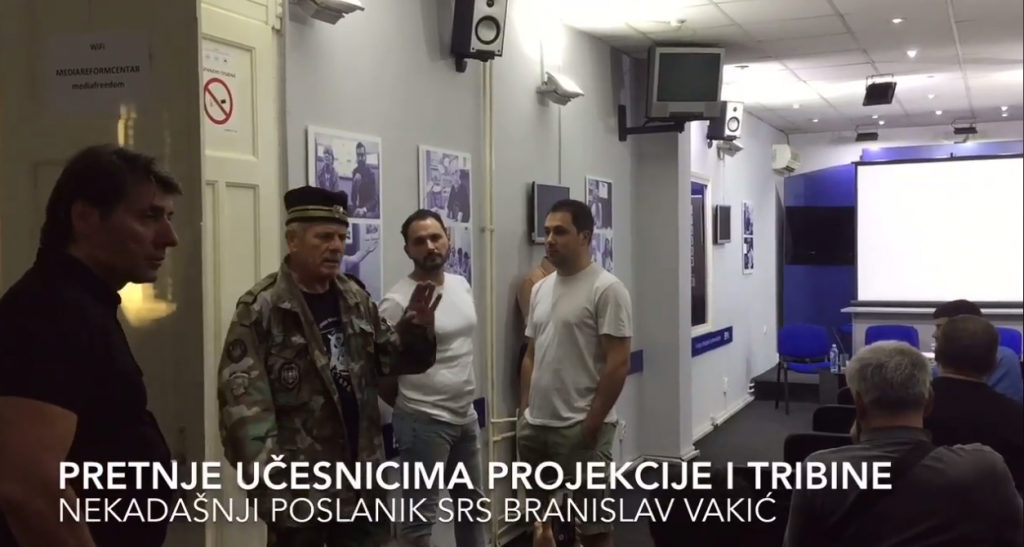
After the screening, Vakic boasted on his Facebook profile that he “couldn’t believe how much respect the police had for Chetniks” and that “they listened to my commands and the order for everyone to leave the room.” He greeted all the police officers present at the Media Center who “obeyed his orders”.
The “Albanian Women are our Sisters“ documentary talks about the relations between Kosovo and Serbia from the point of view of the past, present and future. The screening was supposed to be followed by a discussion, featuring a co-author of the film Darko Sper, a film protagonist Nadezda Kostic and sociologist and activist Djokica Jovanovic. The screening of the film was also postponed in Kraljevo and only those attending the “Mirdita, dobar dan” Festival in Belgrade were able to see it. The festival was held in the same year in the capital city and was accompanied with a lot of tension. The film is a joint production of the Independent Journalist Association of Vojvodina, BIRN Kosovo and Forum ZFD, supported by the EU delegation in Serbia.
On June 1, 2019, the authors of “Albanian Women are our Sisters” were awarded the “Mirdita, dobar dan!” Festival Prize. The film promotes solidarity among anti-war activists, who are labelled as traitors in Serbia and receive threats constantly. “The films contains stories about people who warn about the horrors of war and resist mobilization for war. It busts the myth of perpetual victims and culprits and it represents a bright fulcrum of the cooperation between the two societies”, it is stated in the explanation of the jury’s decision.
Vakic negates all charges during court procedure
On October 2, 2018, the Prosecutor’s Office in Nis accused Vakic of causing an incident in Nis. The indictment quotes all the nastiness that he uttered at the Media Center and directed towards the production crew and participants in the discussion that was supposed to be held after the screening. He was charged with endangering safety of several persons, for which the Criminal Code of Serbia envisages a prison sentence of between three months and three years.
All the aggrieved parties had been interviewed at the Prosecutor’s Office before the charges were pressed. Since most of them are from Novi Sad, they were interviewed at the Prosecutor’s Office in Novi Sad, where they reiterated that Vakic had insulted and threatened them and endangered their safety on June 22.
Vakic was interviewed at the Prosecutor’s Office in Nis on January 22, 2018 and he completely rejected all the charges, stating that, despite a video recording of what he said, the charges against him were completely false. He said that he had come to the screening by chance and that he had only talked to the people at the Media Center and that he hadn’t made any threats to anyone.
“I was commenting on the title of the film and the events in Kosovo, since I took parts in all wars as a volunteer and I was a volunteer there as a member of the Serbian Chetnik Movement. I was alone in the room and said that there were many young people outside who wanted to come in and attend the screening and that they were against the screening. I used the power of my authority to persuade them to step back and prevent them from entering the Media Center by warning them there were 20 police officers securing the event. Those young people are members of the “Obraz” organization and I hold them in high esteem,” Vakic said.
Bojan Stojkovic, leader of “Srbska cast” (Serbian Honor) among the attackers
The founder of “Srbska cast” (Serbian Honor) Bojan Stojkovic was among the protestors in front of the Media and Reform Center in Nis, trying to prevent the screening of “Albanian Women are our Sisters”. British “The Guardian”, citing Bosnian portal “The Journal News”, described him as one of the founders of a paramilitary formation in the Republic of Srpska, who were fighting against the opponents of the President of the Republic of Srpska Milorad Dodik.
“The Guardian” wrote that the people who would comprise this paramilitary formation received training at the “Russian-Serbian Humanitarian Center” in Nis. The media have been speculating for quite a while that it is actually a Russian military base, used for “spreading the Russian influence in the Balkans”. Since the Center was established, the media have been trying to get an answer to the question whether it would request a diplomatic status in Serbia and in 2017 it was rumored that “a coup d’état attempt in Montenegro was prepared there”.
In the interview he gave N1, Stojkovic denied the accusations that a paramilitary formation had been formed and said that the motives behind the accusations against him and the “Srbska cast” organization, for which he claims to be a humanitarian one, were of political nature. He also dismissed the claims that the members of his organization were trained at the Serbian-Russian humanitarian Center, claimed “Insajder”.
However, Stojkovic referred to the incident in Nis on several occasions on Facebook, where he is followed by more than 27,000 people. Among other things, he wrote: “A screening of a documentary on the plight of the Shqiptari in Kosovo was supposed to be held today! Thanks to “Delije”, “Beli Krstic” Squad (“Meraklije”), Chetniks and “Srbska cast”, we managed to thwart this attempt to organize this criminal and shameful event and their speeches were cut short! Serbia will live forever, as long as its children are faithful!”
He also posted a video with the following comment: “Burning the so-called state of Kosovo (flag). Nobody who troubles my people can walk freely,” after which he also posted that they had managed to “expel the pests from Nis.”
An interesting detail is mentioned in the statement Vakic gave at the Prosecutor’s Office in Nis, regarding his nationality, i.e. his nickname Attila. Vakic himself says that he is widely known for his nickname because his mother is Hungarian. “I can always gather people in Vojvodina who will volunteer to defend Serbia, which is why I’m a target for all enemies of Serbia,” Vakic said at the Prosecutor’s Office.
The decision of the Basic Court in Nis stipulates all the details from the medical history, which allegedly make Vakic incapable of following the court procedure. It is stated that he was referred to a psychiatric hospital after the verdict passed by the Magistrate’s Court, which ordered a treatment at a psychiatric institution while he was on bail pending trial over a period of one year. As VOICE has learnt, a case against Vakic at the Magistrate’s Court was led because of domestic violence.
Apart from all that, Vakic had had other issues with judicial bodies. As his criminal record shows, Vakic was convicted before the Municipal Court in Nis in 1993 for breaking the Law on Weapons and Ammunition. He was sentenced to a suspended prison sentence of five months for transporting weapons in an illegal manner. Furthermore, Vakic was fined RSD 100,000 by the Basic Court in Nis in 2011 for domestic violence. Two years later, this sentence was changed into a 100-day imprisonment sentence.
Chetnik voivode was a volunteer in all wars in former SFRY
When you visit the Facebook page of Branislav Vakic, the first thing you’ll notice is his photo, fully armed and wearing a Chetnik uniform. Most photos on his page are of the emblems of the Serbian Chetnik Squad. He claims to be self-righteous, firm towards enemies, a benefactor and a patriot. He states he is a former top-athlete from Yugoslavia – a boxer. He doesn’t say anything about his education.
When it comes to his political career, he says that as a former party official at the Serbian Radical Party he was a member of the Serbian parliament during five terms. He was the chair of the Board in charge of Sports and Youth at the Serbian Parliament and vice-chair of the Board in charge of Safety of the Federal Republic of Yugoslavia!?
When it comes to his activities as a Chetnik, he states that in January of 1991 he was elected the Vice-president of the Serbian Chetnik Movement. In the war-zones in Herzegovina in May 1992, he received the title of a “Chetnik major”. In 1993, in the region of Romanija mountain, at the Knezina monastery, he was anointed and Vojislav Seselj issued a decree proclaiming Vakic a Chetnik voivode.
The “Sandzak press” electronic daily newspaper published a text in August of 2017 about war campaigns of Branislav Vakic in east Herzegovina (Trebinje, Nevesinje, Ljubinje, Gacko, Bileca). The text quotes an official note of the office of the State Security Agency in Nis of July 9, 1992 under a working title “Extremism in the country“. The note states that Branislav Vakic, aka Attila, plundered the property of Bosnians on several occasions and transported the loot to Nis, where, aided by his relative Vladimir Puric, he stored it in a weekend house in the area of Suvi Do, near Nis.
He transported freight vehicles with Mostar license plates, and once he drove a vehicle belonging to “Elektrodistribucija Dubrovnik” (a power-supply company from Dubrovnik). He stole from Bosnian houses and transported to Nis household appliances (TVs, video-recorders and tape-recorders). What’s more, he stole weapons and ammunition of the Army of the Republic of Srpska from war zones and later sold them in Nis.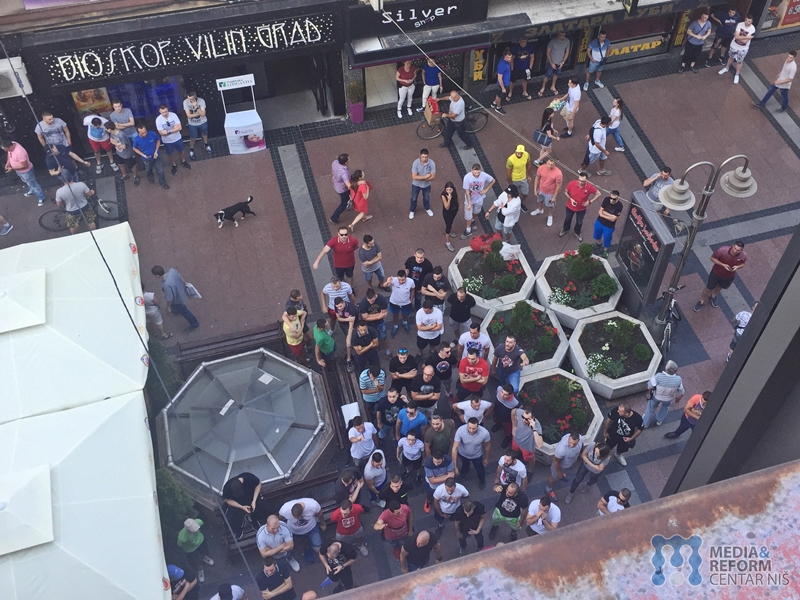
The “Vreme” weekly magazine ran an article on June 17, 2010 about tapping and tracking the members of the Serbian Chetnik Movement during the war in Bosnia and Herzegovina. One of those monitored was Branislav Vakic, who was followed during operations “Tomson” and “Jug”, whose aim was to establish whether Seselj, the Serbian Radical Party and the Serbian Chetnik Movement had any other political ambitions on the territory of Serbia, apart from their “glorious war-waging“ in “all Serbian lands”. These activities of the Agency were in progress continuously. The commanders of that military line, Branislav Vakic, Ljubisko Petkovic, Zoran Drazilović and others, were under constant supervision, and so were their subordinates in the chain of command.
The “Tomson” and “Jug” actions resulted in thousands of pages of official notes, analyses and information. This compiled and well-documented collection suggests that the Serbian Radical Party had thoroughly developed a plan for a violent takeover of power in Serbia, after “social unrest of great proportions” (Seselj) was ignited. The plan was based on Malaparte’s Technique of Revolution, and Vakic and others were explaining that everyone should occupy radio and TV stations, police stations, local bodies of authorities in their respective towns and cities.
Vakic’s and Petkovic’s task was, among other things, to provide their trustworthy people all over Serbia with weapons stolen in the war zones in Croatia and Bosnia and Herzegovina and smuggled into Serbia in various ways, including using coffins containing bodies of killed fellow-fighters (on several occasions). The weapons were hidden in houses, attics, stables or buried. The Agency closely monitored the process and was provided great help from boastful “Chetniks”, drunkards, bullies and criminals. The “Tomson” and “Jug” actions also resulted in confiscation of thousands of weapons, hundreds of kilograms of explosives, as well as other devices and parts of military equipment. Once they worked out a local case, the Agency would inform the Public Security, which then arrested, confiscated and reported the culprits, but only for breaking the Law on Weapons and Ammunition.
Practicing boxing skills in Yugoslav Parliament
The Parliament of the Federal Republic of Yugoslavia held a secret ballot on June 1, 1993 upon an initiative of the Serbian Radical Party to release the then President of FRY Dobrica Cosic for allegedly breaking the Constitution of FRY. During the session there was an incident in the hall of the building between Branislav Vakic, then MP from SRP, and the vice-president of the Serbian Renewal Movement Mihailo Markovic, also a MP at the time. Vakic, who was proclaimed a Chetnik voivode just one month before the incident by Seselj, assaulted Markovic and broke his jaw.
In the afternoon, several thousand people, mostly supporters and members of the Serbian Renewal Movement, gathered in front of the parliament building to protest against the incident. The rally was organized under the slogan “Stop fascism”. After a protest walk around the streets of Belgrade, the rally turned into a clash between the protestors and the police in front of the federal parliament building. A police officer called Milorad Nikolic died, while 32 people were injured.
The conflict ended with brutal arrests and beating up of the president of SRM Vuk Draskovic, his wife Danica Draskovic, as well as several other vice-presidents of SRM. 131 people were arrested all together.
Vakic has never been charged for his physical assault on Markovic. On the contrary, he was promoted to the vice-chair of the Board in charge of Safety of the federal parliament.
VOICE team












